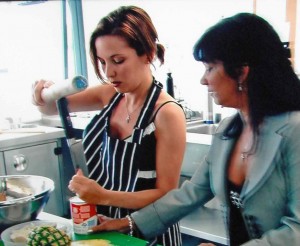The Restaurant on BBC2 promised to plumb further depths of the stupidity of the deluded members of the British middle-class who convince themselves that running a restaurant is some sort of decadent leisure activity for the indolent celebrity class rather than be a very hard way of making a living. (Beware: spoiler alert below).
There was some shocking ineptness from the start when the contestants were asked to cook a ‘signature’ dish — some of them tried something they’d never even attempted before. They knew that their dish would be served to Raymond Blanc (with his two Michelin stars), although they might not have been aware that he’d be wandering round the kitchen looking at the packaging on their food. Even so, it was staggering that three of the couples went shopping for their food in Asda (‘voted Britain’s cheapest supermarket). Now Asda can do a few foodie things that even M&S and Waitrose don’t do (chopped up organic carrot batons for one) but its customer base cannot be said to be the most discerning smoked salmon connoisseurs. (I’m not being a food snob. I go there myself sometimes where it’s fine for basic things but a smoked salmon specialist it’s definitely not.). It was no surprise that they failed to find gravadlax there — this is probably only reliably found at Christmas in places like M&S, though Waitrose has plenty of types of smoked salmon and may do it all year round. The thought of going to a specialist smoked fish supplier probably never crossed their minds. Even so, this pair did nothing with their plain Asda smoked salmon except put it on a plate with a load of chopped up beetroot or something and a few crusts of bread. They then stood around looking pleased with themselves while the other contestants busted a gut to finish their dishes in an hour. Even so, they survived until next week.
One of the most intriguing things about this reality show is the mismatched abilities of the couples. One has to deal with front of house while the other is the chef. Often one of the two is reasonably competent with the other being completely useless and a persistent cause of failure — this leads to fascinating strains in the partnership, particularly when the two are related. There was a team of dominating mother and henpecked son. She was a decent cook but lost out because her son told the lovely Sarah (who has one of the most comically expressive faces on television) that it was impossible to describe his mother’s restaurant concept — completely clueless.
The most amazing part of the show came when another parent-child couple tried to open a coconut — which they eventually manage to bludgeon into a pulp — and then were stumped by a tin of evaporated milk. The daughter of the couple didn’t look so young she’d never have encountered old style tins (without the handy ring on the top) but she seemed to have no concept of what a tin opener was. Perhaps using a tin opener will need to be taught and assessed in schools (maybe it’s on the A-level syllabus for domestic science, which explains youngsters’ ignorance) or perhaps the sharp edges to the tins break health and safety regulations? However, what health and safety types wilfully fail to

recognise is the incredibly dangerous methods people dream up to achieve their objectives left to their own devices. In the case of the can of condensed milk, the opening method attempted was to hold a butcher’s cleaver vertically against the can lid (its point downwards) and to then hammer the knife handle with a rolling pin. The film crew must have been waiting hopefully for an accidental disembowelment if the extra sharp Raymond Blanc knife slipped into the woman’s stomach when she attempted to smash down on the knife to gain access to the tin. Fortunately, Raymond spotted her in time and showed her a helpful gadget that has no doubt saved many lives in similar circumstances in about 150 years of canned food — a tin opener. It would have been fascinating to see the education in other kitchen utensils that this couple may have gained in later episodes — oven gloves, corkscrews, bottle openers, perhaps — but Raymond sadly sent them home for their own safety.
It makes quite a serious point about health and safety as almost everyone has enough in their kitchen to do horrendous damage to both themselves and others — sharp knives, roasting hot ovens, boiling water, naked flames. Yet many people happily cook complex meals involving these and many other dangers while lubricating themselves with alcohol at well over the legal drink drive limit. Watch out for the government to go into cahoots with ready meal makers and supermarkets and bring in the kitchen breathalyser built into appliances which will lock all drawers and turn off all appliances except the microwave (to be used for M&S ready meals) if a cook is found to be over the limit.


